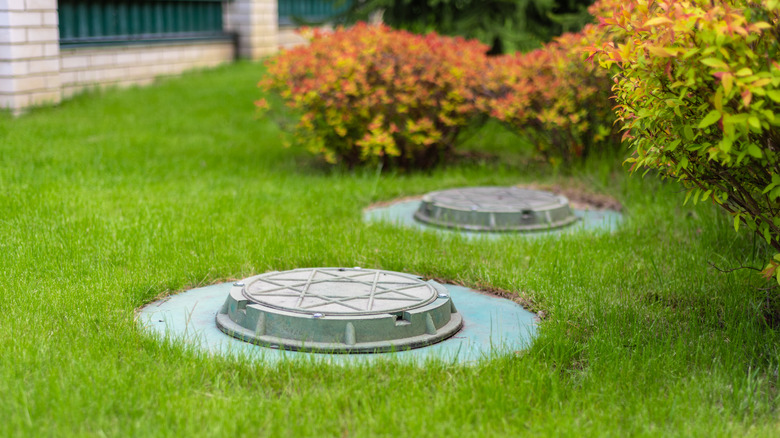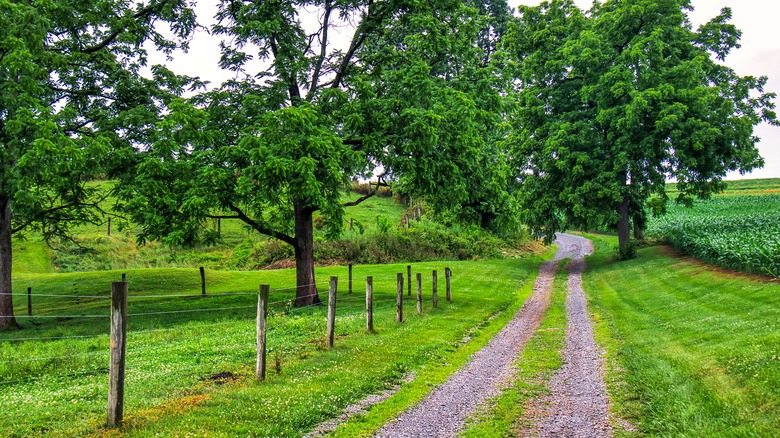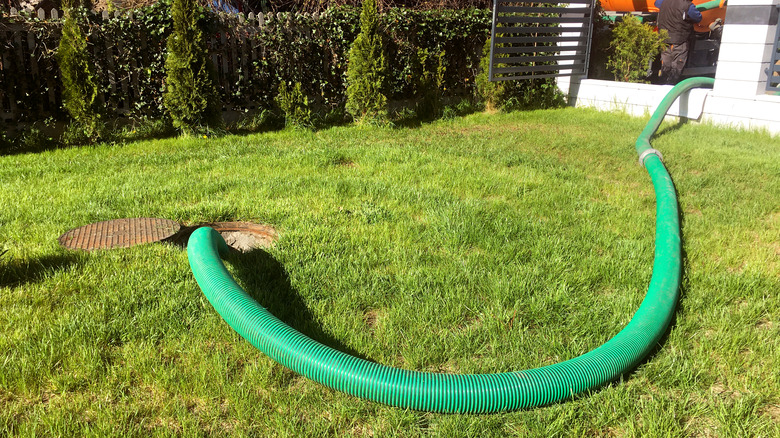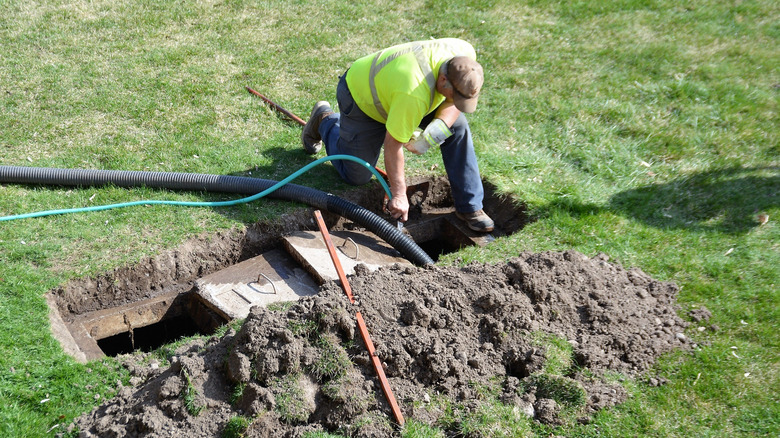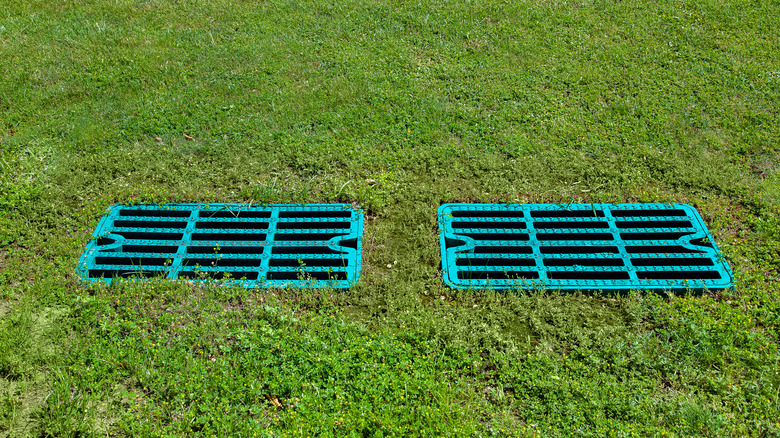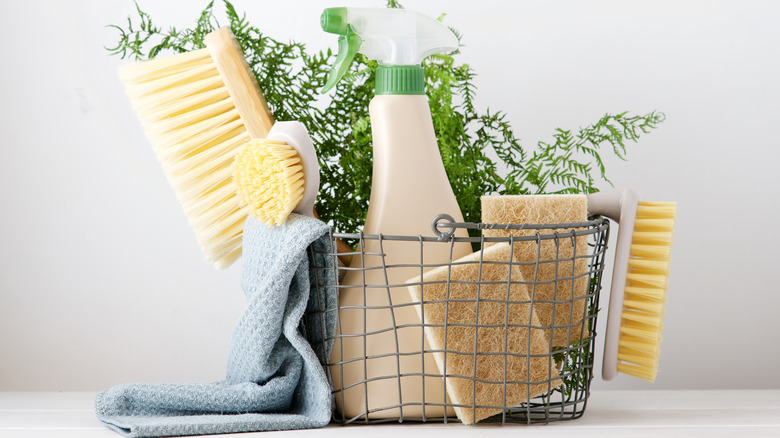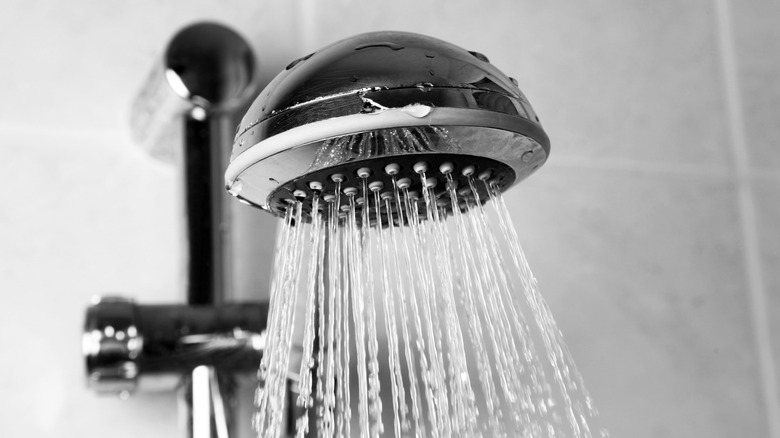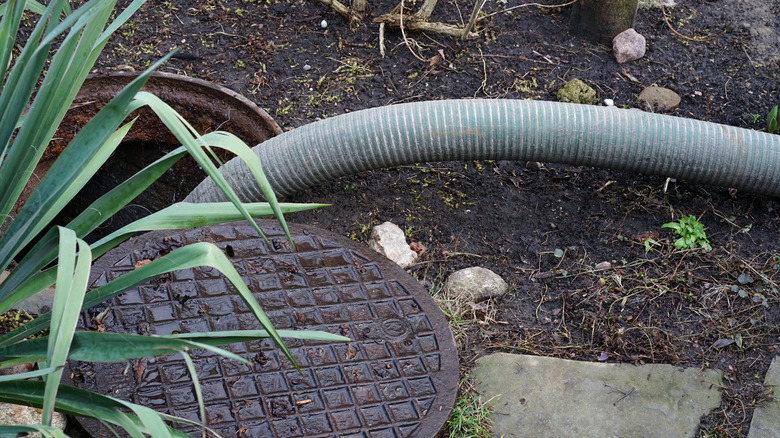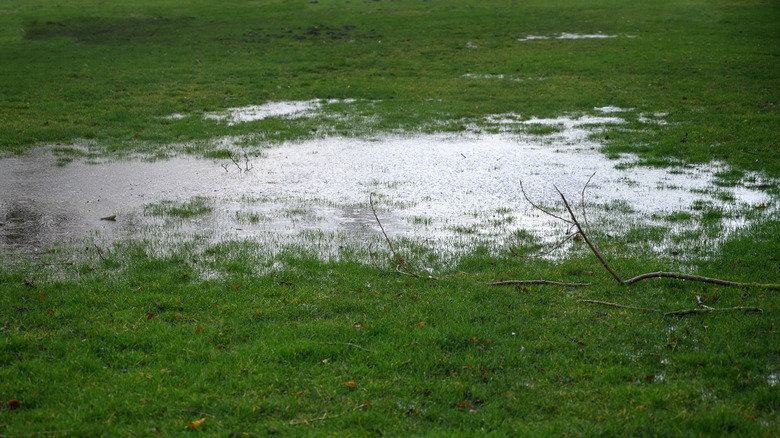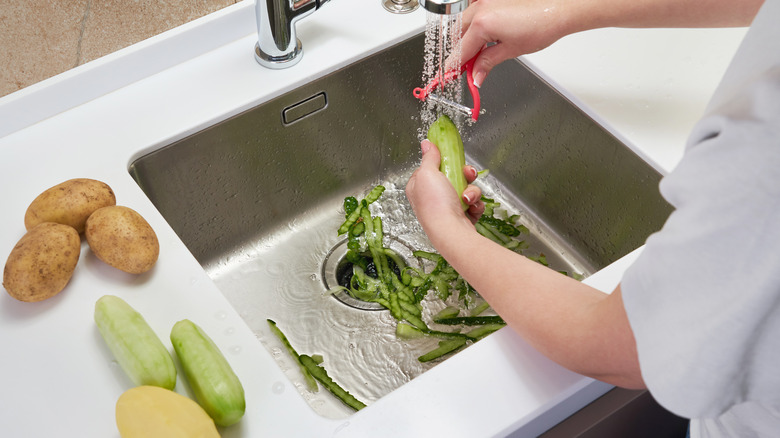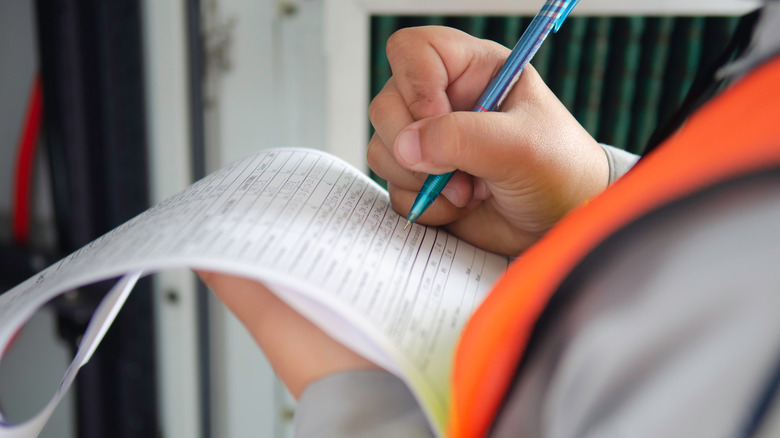What You Should Know About Septic Systems Before Buying A House
If you're considering buying a home in a rural area, it's quite likely that the house is on a septic system rather than municipal water and sewage. But you can just as easily run across a septic tank in a suburb or city as you would on a farm. In fact, according to Redfin, one in five homes in the U.S. relies on a septic system. While it's definitely a different experience from what most in the U.S. are accustomed to, there are advantages to having a septic tank.
It's more cost-efficient (as long as the system is maintained well) and not nearly as intimidating as it might seem. A septic system essentially consists of a large catch basin, a leach field and the surrounding soil, and the pipes that lead from your home to the septic system, rather than pipes that lead from your home to a municipal sewer system, according to the EPA. It's not costly to maintain, though you will have to pay attention to a maintenance schedule. And there are a few things you'll want to do to keep the system in good working order. Before buying a home on a septic system, understanding all of this will help you be prepared and aware of any possible issues.
1. Have the septic tank inspected before buying a house
A septic system inspection is a required part of the purchase procedure in some areas. But if it's not mandatory in your town, you should still have one done so you know if the system is in good working order and up to code, according to Rocket Mortgage. This will save you headaches later because while septic systems are not overly costly to maintain, they are not cheap to replace.
This inspection will tell you many things, including whether your system is functional and up to code, most importantly. It'll also alert you to any potential issues that could be costly to repair later on. An important thing to note is that if the sellers offer to have the system pumped for you before the inspection, don't allow it. This will make it more difficult for the inspector to spot any immediate issues.
2. When viewing the property, look for external signs of a failing septic system
There are some visible warning signs of a failing septic system that you should look out for when touring the real estate property. Even better, you can detect these things without even going into the house, which can be a timesaver. According to Inspectapedia, standing water over the leach field is a red flag, since it could be a sign that the system is overloaded. Foul, sewer-like odors over the leach field are another bad sign.
And while it might not be an immediate red flag, you'll also want to look at the grass over the leach field. If it's more green and thick than the rest of the lawn, and the ground has a spongy texture when you walk on it, that could be a sign that something is leaking or that the system hasn't been pumped in a long time, which can cause long-term damage.
3. A properly-maintained septic system will work for decades
If the septic system is in good condition, the good news is that it won't be expensive to maintain, and it should last decades before you'll need to replace it. According to the EPA, a properly-maintained septic system will last for anywhere from 15 to 40 years, depending on the materials it's been made with. Often, a well-maintained system will last even longer than that.
And that's a good thing because a new septic system can cost anywhere from $5,000 to $10,000, depending on your location and the size and complexity of the system you need to replace. So it's much cheaper to keep it properly maintained. You can do that by being knowledgeable about things that can harm your system, and sticking to a routine inspection and pumping schedule. Also, the less water you use, the less strain on your septic system, so conserving water would be in your best interest.
4. Septic systems are low-maintenance, but not no-maintenance
You'll have to have the system inspected and possibly pumped every three to four years to ensure that it keeps working well, according to Roto-Rooter. That is truly the only cost you should have to deal with in maintaining your system. You don't need things like Rid-X or other additives unless it's a seasonal home, where it will require the addition of the bacteria present in products like that to keep the system working even when it's not actively being used. Those additives might actually cause more harm than good for systems used regularly, upsetting the balance of necessary bacteria that make a septic system function (via EPA).
At the very least, you'll need inspections. Whether you need the system pumped or not will depend on the level of solids in the tank. An inspection will alert you to whether or not it's time to pump, and can give you a decent estimate of how much longer before the system will need to be pumped.
5. You'll have to be mindful of the location of your septic field
If you buy a home with a septic system, you should be provided with a diagram of the system and field on your property. This information is essential because the system can be damaged if you're not careful.
According to Ownerly, you will need to be mindful of any vehicles and heavy machinery on your property. You don't want to drive over a septic system or its leach field since this can damage the equipment and compact the soil, affecting how well the system works. In addition, you'll want to be careful about where you plant any trees and shrubs. Tree roots can damage the system, as can those of particularly large or vigorously growing shrubs. However, growing a lawn or even perennials and native plants over a septic system is fine, according to The Spruce. And you also won't want to pave over it or build any structures over the system or leach field.
6. Things you can do on a daily basis to keep your system in good shape
Keeping a septic system in good working order does require a bit of attention on a day-to-day basis, according to Reazo. There are things you can do that will prolong the health of your septic system and prevent annoying issues and damage. The first is paying attention to your water usage. Flooding the system by doing several large loads of laundry in a day, or taking multiple baths in an evening, can overload the system.
Aside from water usage issues, you'll need to be mindful about what goes down your drains. Bleach and most cleaners can harm the bacteria that make the system work. So you'll want to switch to more eco-friendly cleaners. You should also be careful about what you flush or send down the drain. Medicines, tampons, paint, and other chemicals shouldn't be flushed if you have a septic system.
7. High-efficiency fixtures and appliances are a big help
According to the EPA, low-flow toilets, showerheads, faucets, and efficient washing machines all use less water, which is better for a septic system's overall health and longevity. As noted above, using too much water at a time can overwhelm the system, leading to eventual failure. All of these water-wise fixtures and appliances will help prevent that from happening. You'll also use less water and lower your utility bill, which is a win-win all around.
Low-flow showerheads and faucets aren't very expensive, and there are even gadgets you can add to a regular toilet to make it use less water. This isn't to say that you need to replace all your appliances or plumbing fixtures right away. But when it's time to replace or upgrade them, go for high-efficiency models. Washing machines and dishwashers that use less water will put less strain on your septic system.
8. Regular inspections and pumping are essential
As mentioned above, it's very important to keep in mind that while you won't have any monthly costs related to operating a septic system, you will have to pay to have the system inspected and pumped every three to five years. This costs anywhere between $250 and $500 depending on your location, according to UpNest. This is much more affordable than putting it off, resulting in your system failing and needing to be replaced.
Replacing a septic system is a costly endeavor and one you'll want to plan for in case the worst happens and the system fails. Depending on your location, it can cost in the range of $5,000 to $10,000. Even if your system is currently in good working order, it's a good idea to start setting aside some money in case you have to replace the system in the future. You'll have the peace of mind of knowing that if the worst-case scenario happens, at least you can afford to replace this essential system.
9. It's important to know the signs of a failing septic system
There are certain things you can make a note of when you're viewing a home or attending an open house that might alert you to issues with the septic system. The first is foul odors emanating from the drains. This could be a sign that the system is starting to fail, according to Bob Vila. If possible, run the water in sinks and the bathtub or shower. If the water takes a long time to drain, that's another sign that there might be issues with the septic system.
If possible, it's also a good idea to flush the toilets. A toilet that takes longer than usual to flush is another sign that the septic system might not be working at its optimal level, and could be a warning sign of possible costly repairs down the line. At the very least, this is a sign that the system needs to be cleaned out, which means that either you or the seller will have to pay to have that done.
10. Garbage disposals are a bad idea
Hand-in-hand with being careful about what goes down your drains, food waste should definitely not be something sent into your septic system. This means garbage disposals are a bad idea, according to Hunker. It would be a better idea to compost as much of your food waste as possible instead. This will save wear and tear on your septic system and plumbing pipes while still preventing those food scraps from going to the landfill. And you'll have the world's best soil amendment for your garden or potted plants as a result.
Of course, if your potential home already has a garbage disposal, that doesn't mean you need to get rid of it. Just use it as little as possible, if at all. And if you absolutely must use the disposal, Mr. Rooter Plumbing advises running the cold water when you do so, so that any fats solidify and can be chopped up. Of course, to be extra careful, it's best to avoid pouring anything fatty or oily down the drain.
11. Septic systems are environmentally-friendly
Suppose you do everything you should, including using low-flow fixtures, efficient appliances and not flushing or washing harmful chemicals down your drains. In that case, you'll be living a bit lighter and using less water. Plus, if the system does happen to fail, it's only your property that will be affected, as opposed to when municipal sewers are faulty, which can pollute entire cities and nearby waterways, according to Redfin.
While system failure isn't ideal in either situation, it helps to know that if it fails, you only need to deal with your house's waste and not the entire neighborhood's. This means you don't have to clean foreign waste, but also don't have to deal with foreign pathogens and bacteria. And should your leach field start failing, at least it's only one area of your property being affected and not an entire neighborhood. This is definitely preferable to the pollution when municipal systems fail.
12. Ask for maintenance records from the previous owner
The former owner should have maintenance records for the septic system on the property and make them available to you. This will allow you to see how often the system has been inspected and pumped. It will also give you an idea of how well a system is working. If it's been pumped every year or two, that might be a sign that it's failing since a septic system should only need that every three to five years, according to Inspectapedia.
Aside from allowing you to see the history of inspections and other maintenance, these records will also likely show you which contractors or inspectors were used, which can be helpful if you're new to the area and wouldn't have any idea who to call if there was a problem. Finally, these records can give you an idea of how long a system has been in place and give you a general idea of how long it may be before it might need to be replaced.
13. Ask your real estate agent to refer you to a good inspector
If you're unfamiliar with septic systems or are new to the area, this is an excellent time to ask your real estate agent for a referral to someone they've worked with and trust. A good real estate agent will have a network of specialists that they can refer their clients to, according to UpNest. And you can feel secure in taking an agent's recommendation since they know that a solid real estate career is built on their reputation. They won't want to tarnish that by recommending subpar contractors or inspectors.
This doesn't just apply to septic systems, of course. Good insurance agents, contractors, and other professionals will all be part of an experienced real estate agent's network, and this can be a huge help if you're unfamiliar with the area you're considering moving to. Rural properties come with their own unique issues, and septic systems, along with wells, are just one of them.
